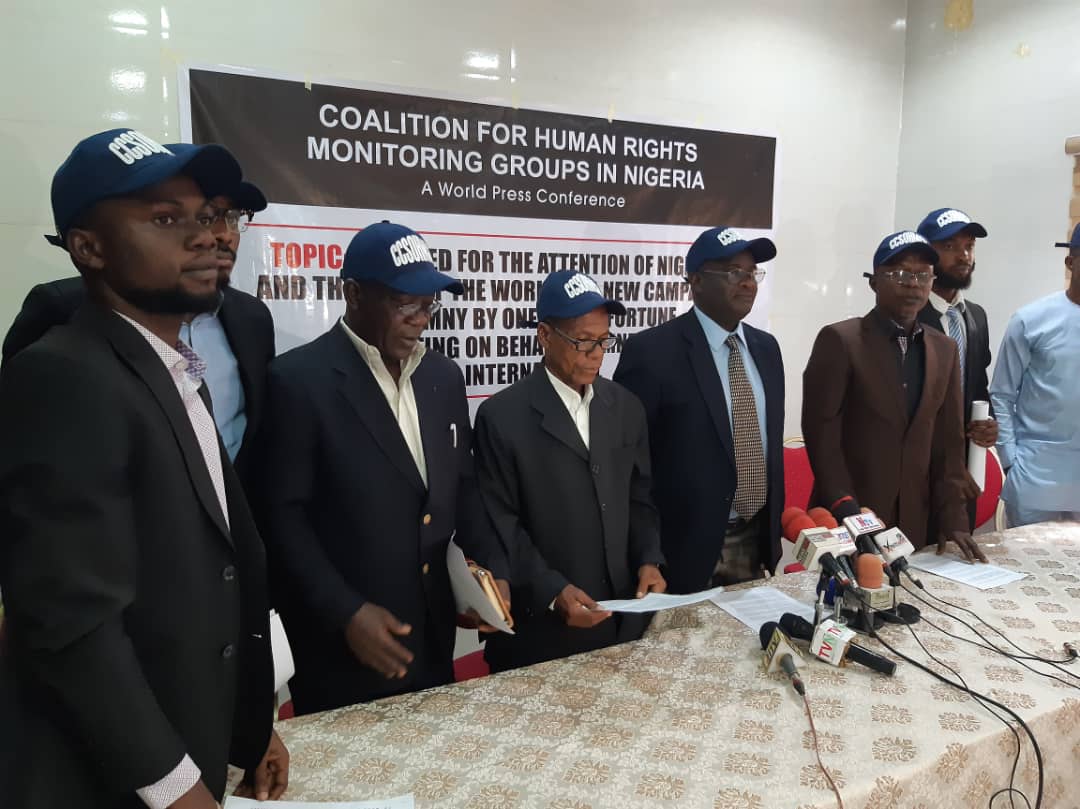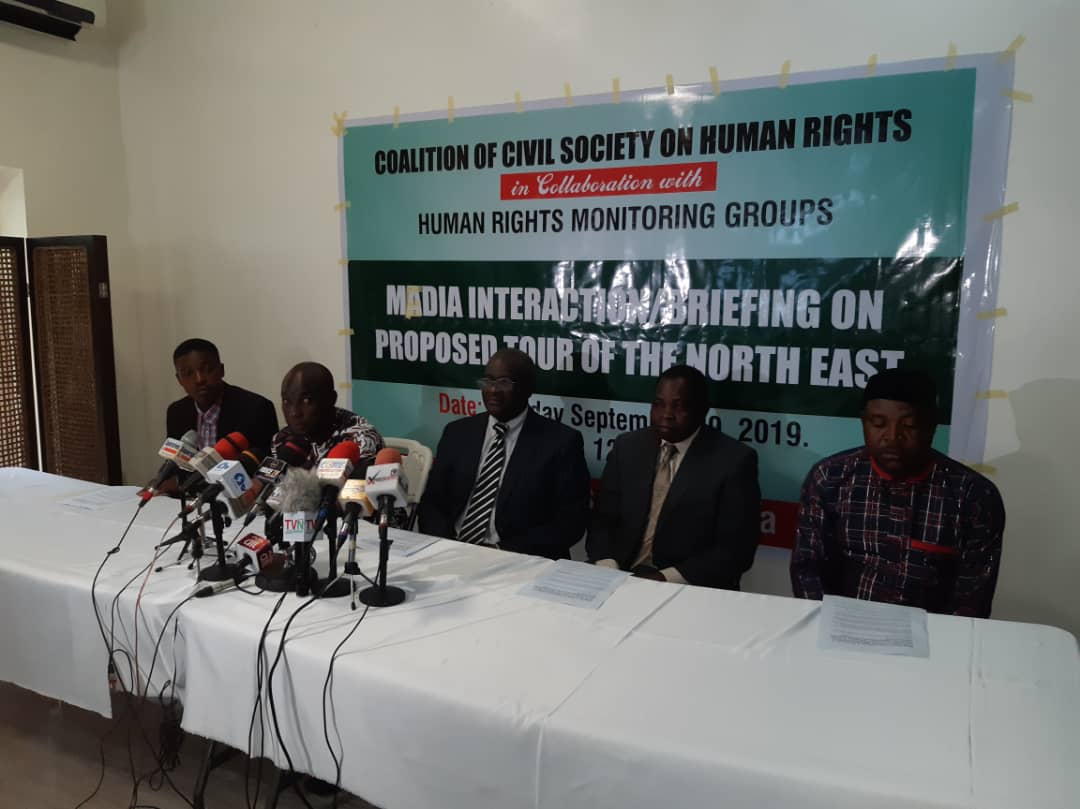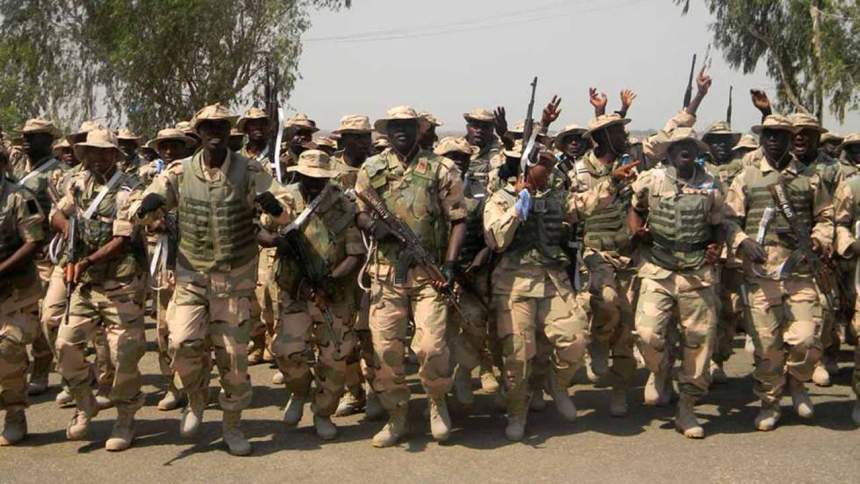Torture and other ill-treatment and unlawful detention by the police and the State Security Service (SSS) continued in Nigeria, Amnesty International revealed in its 2017/2018 report that also accused the President Muhammadu Buhari government of unlawful killings and torture.
TheNewsGuru reports the London-based non-governmental organization focused on human rights launched its 2017/2018 edition annual report today shining light on 15 human rights issues in Nigeria.
“In February, Nonso Diobu and eight other men were arrested and detained by Special Anti-Robbery Squad (SARS) officers in Awkuzu, Anambra state. They were tortured and all, except Nonso Diobu, died in custody. Nonso Diobu was charged with robbery and released four months after arrest.
“At least 10 IPOB members were killed and 12 others wounded by soldiers in Umuahia, Abia state on 14 September. The military claimed that they were killed when they tried to resist the arrest of leader Nnamdi Kanu at his home. Witnesses say that, in addition to those killed, at least 10 IPOB members were shot and taken away by soldiers,” the report read.
UNLAWFUL KILLINGS
At least 10 IPOB members were killed and 12 others wounded by soldiers in Umuahia, Abia state on 14 September. The military claimed that they were killed when they tried to resist the arrest of leader Nnamdi Kanu at his home. Witnesses say that, in addition to those killed, at least 10 IPOB members were shot and taken away by soldiers. The government subsequently banned the IPOB.
On 9 March, a court in Abuja sentenced two police officers to death for their part in the extrajudicial execution of six traders in Apo, Abuja, in 2005. Three other police officers including the leader of the police team were acquitted. In 2005, a Judicial Commission of Inquiry had indicted six police officers for the murders and recommended their trial as well as compensation for the victims’ families. One of them allegedly escaped from custody in 2015.
In September, the High Court in Port Harcourt convicted five SARS policemen for the extrajudicial executions of Michael Akor and Michael Igwe in 2009. The court also awarded 50 million naira (USD143,000) in compensation to the victims’ families.
In December, after huge pressure on social media, the Inspector General of Police agreed to reform SARS.
TORTURE AND OTHER ILL-TREATMENT
Torture and other ill-treatment and unlawful detention by the police and the State Security Service (SSS) continued. In February, Nonso Diobu and eight other men were arrested and detained by Special Anti-Robbery Squad (SARS) officers in Awkuzu, Anambra state.
They were tortured and all, except Nonso Diobu, died in custody. Nonso Diobu was charged with robbery and released four months after arrest.
In May, a high court ordered the SSS to release Bright Chimezie, a member of the Indigenous People of Biafra (IPOB). Instead, the SSS included his name in another case.
Bright Chimezie had not been brought to court by the end of the year; the SSS had held him in incommunicado detention for more than one year.
Ibrahim El-Zakzaky, leader of the Islamic Movement of Nigeria (IMN), and his wife remained in incommunicado detention without trial since their arrest in December 2015 despite a court ordering their release and compensation.
In September, the Nigerian police launched Force Order 20 which sought to reduce the excessive use of pre-trial detention by providing free legal advice to suspects at police stations. In December, the Anti-Torture Bill – intended to prohibit and criminalize the use of torture – was signed into law.
ARBITRARY ARRESTS AND DETENTIONS
The military arbitrarily arrested and held thousands of young men, women and children in detention centres around the country. Detainees were denied access to lawyers and family members. The army released 593 detainees in April and 760 in October.
By April, the military detention facility at Giwa barracks, Maiduguri, held more than 4,900 people in extremely overcrowded cells. Disease, dehydration and starvation were rife and at least 340 detainees died. At least 200 children, as young as four, were detained in an overcrowded and unhygienic children’s cell. Some children were born in detention.
The military detained hundreds of women unlawfully, without charge, some because they were believed to be related to Boko Haram members. Among them were women and girls who said they had been victims of Boko Haram. Women reported inhuman detention conditions, including a lack of health care for women giving birth in cells.
On 24 September, the Minister of Justice announced that the mass trial of Boko Haram suspects held in different detention centres had commenced. The first phase of trials was handled by four judges in secret, between 9 and 12 October. Fifty defendants were sentenced to various terms of imprisonment.
An interim report of the Director of Public Prosecutions showed that 468 suspects were discharged and the trial for the remainder was adjourned to January 2018.
COMMUNAL VIOLENCE
Inter-communal violence linked to lingering clashes between herdsmen and farming communities resulted in more than 549 deaths and the displacement of thousands in 12 states.
In February, 21 villagers were killed in an attack by suspected herdsmen in three communities in the Atakad district of Kaura, Kaduna state. Witnesses said the herdsmen killed, looted, and burned the villagers’ houses.
In June, a communal clash in the Mambilla Plateau of Taraba state left scores of people dead, mostly herdsmen and their families.
In September, at least 20 people were killed when suspected herdsmen invaded Ancha village in the Miango district of Jos, Plateau state, after a misunderstanding between villagers and herdsmen residing in the community.
In October, 27 people were killed by suspected herdsmen in a classroom where they were sheltering after three days of attacks in the Nkyie-Doghwro community of Bassa, Plateau state.
In December, herdsmen attacked at least five villages in Demsa LGA in Adamawa state to avenge the massacre of up to 57 people, mostly children, in November in nearby Kikan community. Residents described being attacked by a fighter jet and a military helicopter as they attempted to flee. At least 86 people were killed by the herdsmen and air force bombing.
ARMED CONFLICT: BOKO HARAM
Boko Haram carried out at least 65 attacks causing 411 civilian deaths, and abducted at least 73 people. Sixteen women, including 10 policewomen, were abducted in June when Boko Haram ambushed an army-escorted convoy on the Maiduguri-Damboa road.
In July, Boko Haram ambushed a team of oil prospectors in a village in Magumeri. Three oil workers were abducted and at least 40 other people were killed, including soldiers and members of the Civilian Joint Task Force.
On 6 May, 82 Chibok schoolgirls, abducted in 2014, were released by Boko Haram fighters in an exchange deal; 113 girls remained in captivity. In November, six farmers in Dimge village in Mafa were abducted and beheaded.
INTERNALLY DISPLACED PEOPLE
There remained at least 1.7 million internally displaced people (IDPs) in the northeastern states of Borno, Yobe and Adamawa; 39% lived in camps or similar settings and 61% in host communities.
The UN said that 5.2 million people in the northeast remained in urgent need of food assistance; 450,000 children under five were in urgent need of nutrition. In July, Doctors without Borders reported that 240 children had died from malnutrition in Borno state.
On 17 January, the Nigerian Air Force bombed an IDP camp in Rann, headquarters of Kala Balge local government, in Borno state, killing at least 167 civilians, including many children. The military said the bombing was an accident as Rann was not identified as a humanitarian camp.
LACK OF ACCOUNTABILITY
In June, the Special Board of Inquiry to investigate allegations of gross violations of human rights, established by the Chief of Army Staff, found that Giwa barracks was extremely overcrowded, with poor sanitation and insufficient ventilation, factors which resulted in detainees’ deaths. It cleared senior military officers, alleged to have committed crimes under international law, of wrongdoing.
In August, acting President Yemi Osinbajo set up a presidential investigation panel to probe allegations of human rights violations carried out by the military. Between 11 September and 8 November, the panel sat in the capital, Abuja, and in the cities of Maiduguri, Enugu, Port Harcourt, Lagos and Kaduna.
In its December preliminary report, the Office of the Prosecutor of the ICC announced that it would continue to assess the admissibility of the eight potential crimes it had previously identified as having been allegedly committed in Nigeria.
RIGHT TO HOUSING AND FORCED EVICTIONS
Authorities in Lagos, Imo and Rivers states continued to forcibly evict thousands of residents, without adequate notice, compensation, or the provision of alternative accommodation and resettlement.
In Lagos state, at least 5,000 people were forcibly evicted from Otodo-Gbame and Ilubirin waterfront communities between March and April, in violation of previous Lagos State High Court orders. The orders restrained state authorities from demolishing the homes of affected communities consisting of at least 300,000 residents, and ordered them to consult with residents.
In March, the Lagos state government pulled out of the consultations saying the communities’ demand for resettlement was unreasonable. During the forced eviction of Otodo-Gbame community on 9 April, at least two people were shot, one fatally, as the police fired at unarmed residents. There were no investigations into the shootings. On 13 June, Lagos state authorities forcibly evicted hundreds of people from Ijora-Badia community.
On 15 June, Rivers state authorities forcibly evicted hundreds of people from Ayagologo waterfront community in Port Harcourt. On 15 November, police in Lagos arrested and detained 158 residents, including six women one of whom was pregnant, who were protesting against forced evictions in the state.
On 2 February, a High Court in Abuja declared threats of forced evictions without the service of statutory notices illegal. It urged state authorities to take measures to confer security of tenure on affected residents. The judgment prevented the Abuja authorities from forcibly evicting hundreds of thousands of residents in Mpape community. On 21 June, a Lagos State High Court found that forced evictions and their threat were unconstitutional and amounted to cruel, inhuman or degrading treatment.
WOMEN’S RIGHTS
Nigeria’s federal Parliament and Adamawa and Gombe states continued to debate the Gender and Equal Opportunities Bill. In October, ECOWAS Court held that Nigeria violated the right to dignity of three women by wrongly accusing them of being sex workers, and unlawfully arresting and verbally abusing them.
IDP women and girls reported gender-based violence including rape and sexual exploitation, often in exchange for food and other necessities, by military officers and members of the Civilian Joint Task Force in the northeast. Households headed by women reported discrimination in access to food assistance and livelihood opportunities in some locations.
A group of women who were previously confined to Bama IDP camp campaigned for the release of their husbands from military detention, and for justice for rape and other abuses they suffered while in the camp between 2015 and 2016. The Chief of Army Staff was reported to have ordered an investigation in June into misconduct by soldiers in the camp.
HUMAN RIGHTS DEFENDERS
Human rights defenders continued to face intimidation for their work. Parliament debated a bill to regulate and restrict the work of NGOs. If passed, it would establish an NGO Regulatory Commission to keep a register of all NGOs, co-ordinate their activities, and monitor their budgets and funding. A public hearing on the bill took place in December.
On 19 July, police arrested and detained Maurice Fangnon for six days for calling for investigations into alleged killings and assaults of residents in Otodo-Gbame community. He was rearrested on 12 December with Bamidele Friday; they were released on bail on 22 December.
Raymond Gold faced criminal charges carrying a maximum three-year prison sentence for demanding that an oil company conduct an Environmental Impact Assessment on activities which harmed the environment. On 6 June, police officers harassed, beat and injured Justus Ijeoma at Onitsha Area Command. In October, he received a written apology from the Area Command.
FREEDOMS OF ASSEMBLY AND ASSOCIATION
The security forces disrupted, in some cases violently and with excessive force, peaceful protests and assemblies. The police continued to deny IMN, which was banned by the Kaduna state government in 2016, the right to peaceful protest. On 25 January, the Abuja police arrested nine IMN members in connection with a peaceful protest demanding the release of Ibrahim El-Zakzaky.
On 25 July, police in Kano city prevented a group of women from protesting against the persistent rape of women and children in the state. On 8 August, police violently dispersed peaceful protesters who demanded the return of President Buhari who was in the UK for medical treatment.
FREEDOM OF EXPRESSION
Journalists were harassed, intimidated and arrested. On 19 January, police raided the offices of Premium Times and arrested publisher Dapo Olorunyomi and correspondent Evelyn Okakwu for several hours, after the Chief of Army Staff accused the newspaper of offensive publications.
On 19 April, Kaduna state police arrested and detained Midat Joseph, a journalist with Leadership newspaper, for a WhatsApp comment. He was taken to court the next day on charges of criminal conspiracy, inciting disturbance and injurious falsehood.
On 31 July, the court dismissed the case on grounds of lack of diligent prosecution. On 19 September, the Katsina state police arrested three bloggers, Jamil Mabai, Bashir Dauda and Umar Faruq, for criticizing the Governor. Bashir Dauda and Umar Faruq were released after one week and Jamil Mabai was detained for 22 days.
On 27 October, Audu Maikori, who was arrested for publishing false information online, was awarded 40 million naira (USD112,700) in compensation for unlawful arrest and detention.
CORPORATE ACCOUNTABILITY
In June, the widows of four men from the Ogoni region in the Niger Delta who were executed following an unfair trial in 1995, filed a lawsuit in the Netherlands against Shell, demanding compensation and a public apology. They accused Shell of complicity in the unlawful arrest and detention of their husbands during a brutal crackdown by the then military authorities on the Movement for the Survival of the Ogoni People. International organizations called for Shell to be investigated for involvement in these crimes.
Environmental pollution linked to the oil industry continued to undermine the economic, social and cultural rights of the Niger Delta communities. The government took limited steps to address pollution in the Ogoni region of the Niger Delta, as recommended by the UN Environment Programme (UNEP) in 2011.
However, local communities expressed frustration at the slow progress of the initiative and because operations on the ground had not begun. Shell failed to comply with some of UNEP’s key recommendations.
In September, operations to clean up the pollution caused by two large oil spills in 2008 began in the Bodo community in the Ogoni region.
RIGHTS OF LESBIAN, GAY, BISEXUAL, TRANSGENDER AND INTERSEX PEOPLE
Arrest, public shaming, extortion of and discrimination against individuals based on their sexual orientation were reported in several parts of the country. In April, the Nigerian police arraigned 53 men in a magistrate court in Zaria, Kaduna state, for conspiracy and unlawful assembly and for belonging to an unlawful society. They were accused of attending a gay wedding and granted bail.
In August, about 42 men and boys between 12 and 28 years old were arrested at a hotel in Lagos while attending an HIV intervention programme organized by an NGO. They were charged with “engaging in gay activities”. The police paraded the victims to the media.
DEATH PENALTY
Death sentences continued to be imposed; no executions were recorded. In July, at the National Economic Council, state governors agreed to either sign execution warrants or commute death sentences as a way of addressing overcrowding in prisons. Death row prisoners reported that execution gallows were being prepared for executions in Benin and Lagos prisons.
In August, the Ogun state government announced that it would no longer maintain an informal commitment to refrain from authorizing executions. In September, the Senate passed a bill prescribing the death penalty for kidnapping.


